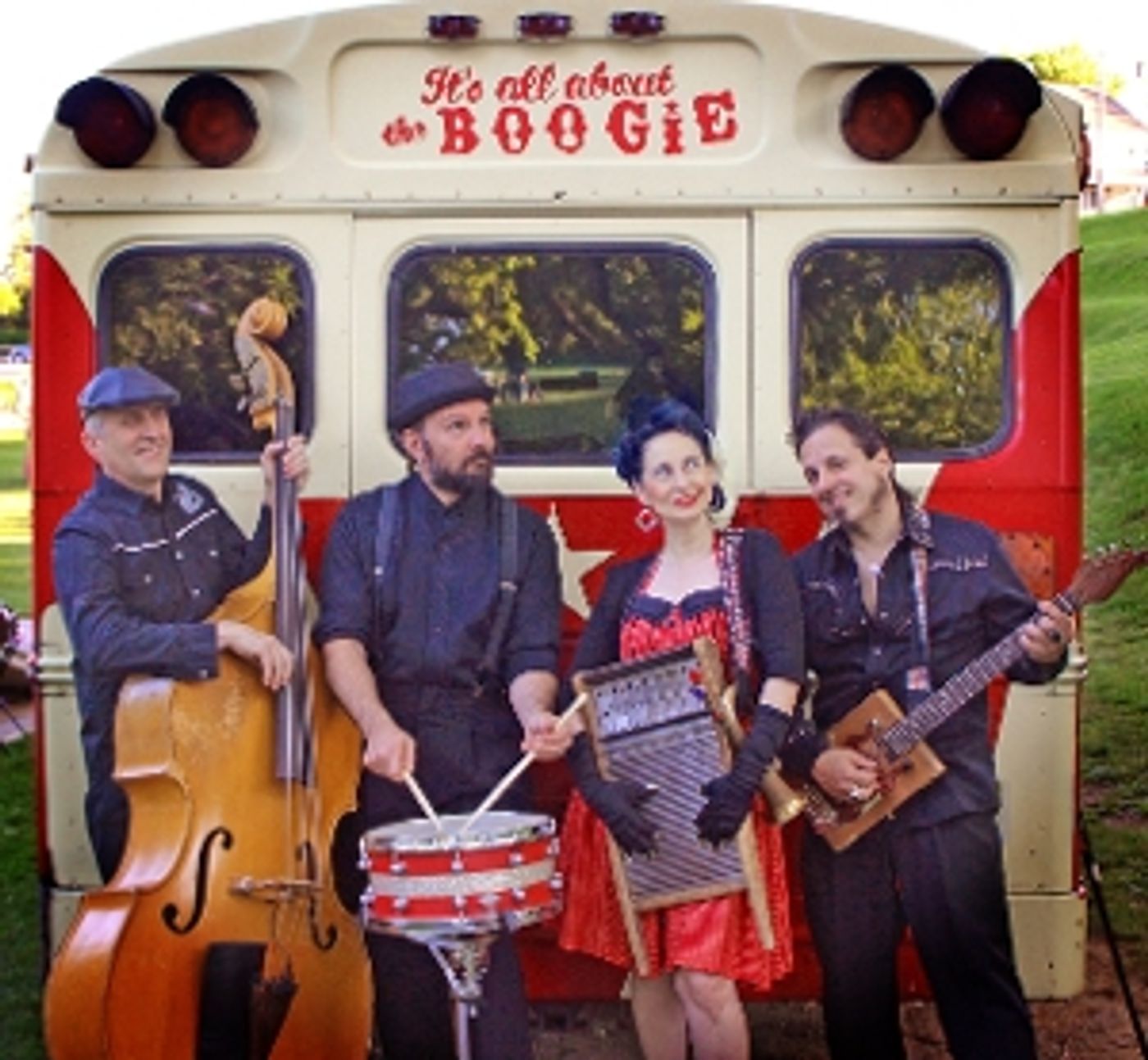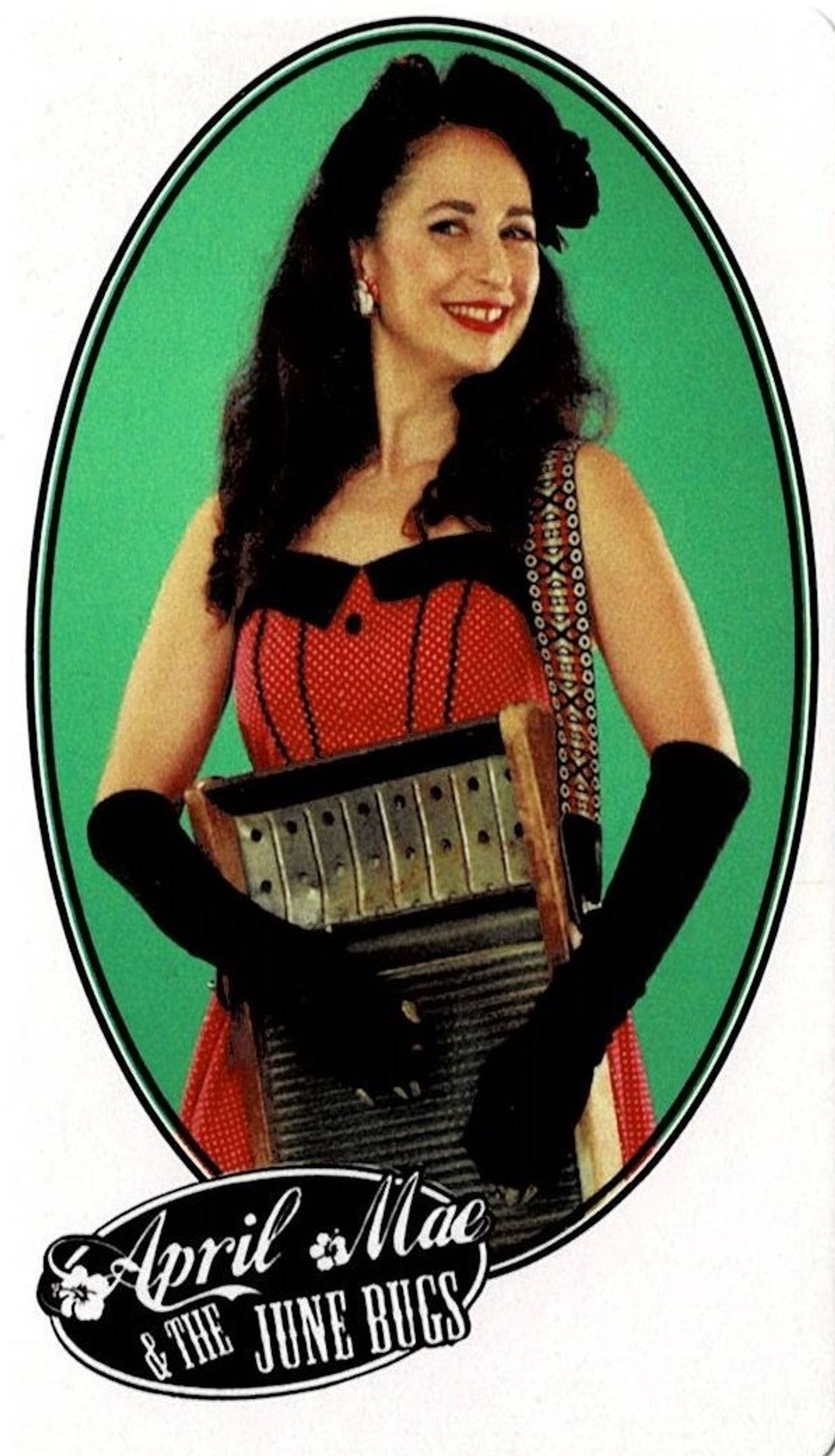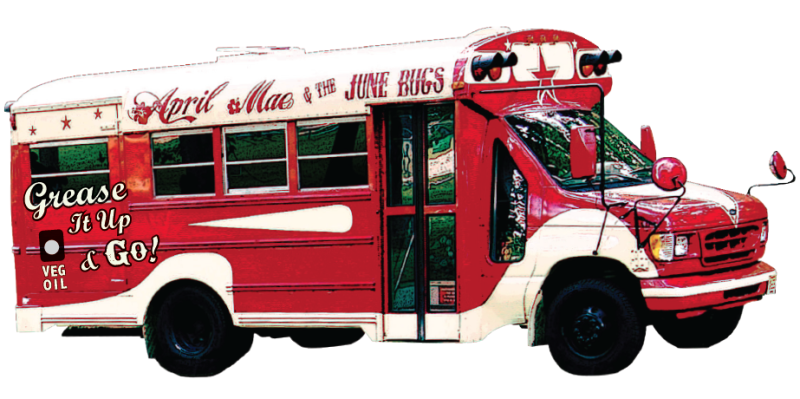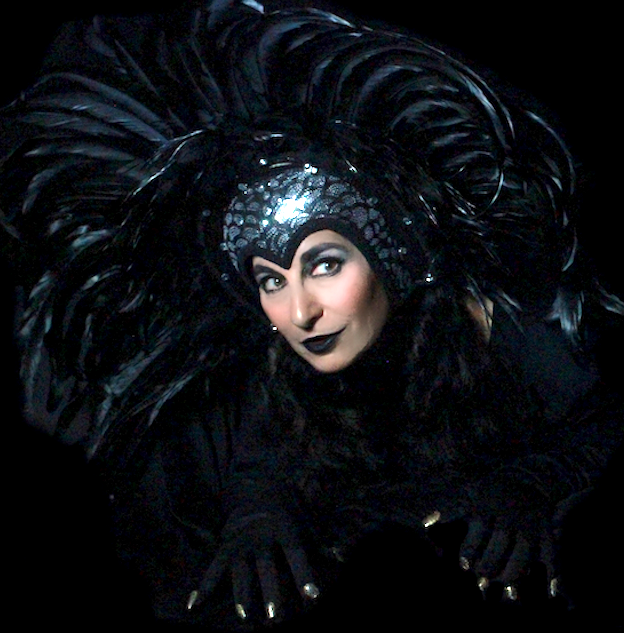Interview: April Mae Iorio of APRIL MAE AND THE JUNE BUGS
April Mae and the June Bugs' Bring Their "Boogie BOO! Halloween Review" to Studio 67 in Medford, New Jersey for a Night of Bewitching Fun

Mary Armstrong of The City Paper described the rockabilly-rooted quartet, the April Mae & June Bugs as having a "sound built on cigar-box guitar, slap bass, washboard, (and the swingin'est skins) . . . taking familiar roots genres and twisting them around Mae's elbow-gloved, gold-capped fingers." The group blends rural, jump blues, retro-swing and folk music with a feeling of 1940's jive, for a completely unique and authentic sound. April Mae Iorio (who goes by the stage name "April Mae") and her partner "Catfish" Dave (Dave Fecca), along with Topher Horner and Tony Mascara, have been traveling the country and bringing their sweet sound to a variety of venues from music festivals and swing dance halls to speakeasy burlesque shows and rockabilly hoedowns since their inception in 2010. That was also the year they released their debut album, April Mae & the June Bugs. They have since produced six other albums, been featured in Jon Miller's 2016 documentary film on American Roots instruments Strung Together, and performed with numerous musicians, including Pete Seeger, J.M. Van Eaton, Eric Frey of The Revelers/Red Stick Ramblers, and Washboard Chaz. Their albums have received airplay on over one hundred radio stations across the United States and Europe and between gigs, they also produce unique products, such as June Bug Sudz (chocolate stout beer soap).
The group is as distinctive as their tour bus. April Mae, sporting a signature 1940's victory roll hairdo and cat-claw gloves, is lead vocalist, washboard percussionist and sometimes kazoozaphonist while "Catfish" Dave plays cigar box guitar, banjo and mandolin. The pair are completed by Topher Horner on upright bass, and Tony Mascara, swingin' the skins and implements of percussion. In 2011 Mae realized a dream inspired by her love of vintage trains, school buses and bread trucks by purchasing a diesel school bus and converting it into their unmistakable, affectionately-named "Boogie Bus." The bus runs on vegetable oil and evokes classic nineteen-forties vibes with whimsical candy apple red and banana cream stylings which Mae designed.
I spoke with Mae as the band prepares for its upcoming gig "Boogie BOO! Halloween Revue" on October 23, 7 p.m. at Studio 67 in Medford, New Jersey, an evening that promises to be full of bewitching fun.
Q. What inspired your love of music? Did you grow up in a musical family?
A. I grew up in a musical household, music was all around me. My parents are musicians, as were their parents and many Aunties. Rehearsals were always held at our house and I loved hearing my parents' playing music. If they weren't singing or playing, music was on the stereo. A very early memory was crawling around on the carpet, lying down and looking up at the reel to reel spinning above me, feeling the music wash over my entire body. Music touches us so deeply, it's an integral part of many of my fondest memories.
Q. Were you or "Catfish" Dave performers as children?
A. As a little girl, I took tap dancing lessons and some piano lessons with my Grandma, who had many piano students. She also liked to set up my cousin and I at the piano and have us harmonize with each other. My Dad taught guitar and I had some guitar and bass lessons with him as a teen. I didn't perform then; I was very shy. I actually quit dance school as a kid because I had such stage fright.

"Catfish" Dave on the other hand performed as a teen and was in bands in high school. I've seen some videos from that time, and you can really see his joy of performing take over any shyness he may have had. Although I didn't know him at the time, he was taking guitar lessons from my Dad, who also worked with him on preparing for a talent competition. He continued performing and was in multiple bands when we met.
Q. I know your music has a wide range of influences from rockabilly and blues to swing and New Orleans jazz. Who or what influenced the direction your music took?
A. Prior to the June Bugs, "Catfish" Dave and I were in a blues fusion group called South Saturn Delta. We did some southern touring (even in Mexico) and were awarded the honor of 2009 Emerging Artist finalists at the King Biscuit Blues Festival in Helena, Arkansas. Traveling down south inspired us to dig deeper into the complexities of Americana and Roots Music, adding rockabilly, boogie, swing, gospel, and bluegrass to our list of musical influences.
Q. How did the April Mae & June Bugs get organized?
A. Very serendipitously! "Catfish" Dave & I were invited to perform at a New Jersey Cigar Box Guitar Festival being organized by our friend and neighbor Gerry Thompson, who also built Dave's first cigar box guitar. We knew we wanted an upright bassist, which was new for us, so we booked it as a trio. I knew what songs I wanted for that set and we had an idea of the sound we were going for, but we didn't have a name yet. One day while I was meditating, "April Mae & The June Bugs" popped into my head. It made me giggle! That day Gerry asked me for our band name for the festival poster. When I shared it, he loved it and said, "You have to use that!"
Q. It's interesting that you play a variety of instruments, many of them homemade. Describe these instruments and how you learned to play them.
A. Speaking of our friend Gerry Thompson, he took us to our first Cigar Box Guitar Festival down in West Virginia. We backed him up at that festival, Dave playing lead guitar and I playing electric bass. It was our first foray into that scene, and it was so inspiring! The musicians were playing homemade guitars, made with all kinds of things. European artist and one-man band Paul Moore played washboard, a teapot, and a wooden leg with percussive elements all over it. I didn't realize it at the time but that festival and all the other CBG festivals that followed, had a huge influence on us. People were creating their own instruments.
The washboard I play was a gift from Gerry as well. He found it one day at a yard sale and walked over with it, saying "I thought you might wanna mess around with this." It was all rusty and said "Chicago - Saginaw - Memphis" on the back. I was really lit up by the music and musical legacy of Sun Studios, so I especially loved that it said Memphis on it, also Chicago with its blues heritage. "Catfish" Dave took a Brillo to it and it had a great matte silver finish it felt really nice to brush your fingers over. I had seen folks playing washboards with thimbles, spoons and in Lafayette, LA, they used a tool that almost looked like a bottle opener to play it. I wanted something more delicate, more feminine, even a little campy, that led me to create my cat claw gloves that I use to play the washboard. Because they were homemade, I just kinda found my way with how to use them.
"Catfish" Dave plays a variety of stringed instruments; two of them are cigar box guitars. The great thing about CBGs is that there are really no rules. You can make them with any number of strings, and embellish them any way you like. They are American folk art; the possibilities are endless. Dave has done all kinds of things with his that enable him to get a variety of different sounds out of them. There's a really cool note bend he does on one of them, because he put springs in the body.
There's a really cool documentary about CBGs and CBG artists that we're honored to be featured in called "Strung Together - The Cigar Box Guitar Revolution" by Jon Miller. It's on amazon now. (Sharing the link below) https://www.amazon.com/Strung-Together-Cigar-Guitar-Revolution/dp/B018UR29E4.
Q. What is a kazoozaphone?
A. The KazzoZaPhone is another made up instrument that first lived inside my head. I had been playing a kazoo spontaneously during our shows, and I liked it, but I really wanted something that had more UMPH! I also wanted it to sound more like a horn. I'm really happy with the result! It's fun, it's showy, and I personally think it sounds very unique.
Q. When did your colorfully-decorated bus come about?
A. The Boogie Bus was conceptualized and completed in 2011. She is a diesel school bus, converted to run on waste vegetable oil, so she's a hybrid. We learned about this technology at the Clearwater Festival in New York which Pete Seeger founded. There was a Sustainable Living area, that showcased new green technology. We saw a handful of diesel cars that drove in on diesel, were converted to Veggie, and drove away with waste veggie oil from the French fry vendors at the festival. We were floored! Not only is WVO zero carbon emissions (awesome!), but it's also SO much more economical. Fuel expenses during a long tour can really hammer your tour budget. How perfect this would be for touring! When we got home, we immediately began searching for a diesel car which we converted. Once we realized we could do this, I set my sights on a tour bus.

Q. Can you travel across the country in it?
A. Oh Yes! And we have! We've done regular southern tours circling down to New Orleans, playing shows on the way up and back. The farthest being a tour that included the Republic Of Texas Cigar Box Guitar Festival in Albert, TX. There are many folks who drive WVO vehicles and trucks across the country that help us refuel. Because the bus is a hybrid, we have great options for fuel.
Q. You performed with Pete Seeger and at the Beacon Sloop Club's various festivals in Beacon, New York. How did that come about?
A. The first time we saw Pete Seeger perform was in Philadelphia. He had the entire theater singing with him, in harmony. It was the most powerful musical experience of my life. It was spiritual. It's hard to explain, but I was in complete awe. Pete was in his late eighties at that time, and I regretted that I wasn't aware of him sooner. When I learned that he lived in Beacon, NY which was a little less than four hours away, we made a commitment to see him perform as much as possible.
Pete had founded an environmental sailing club in Beacon called the Beacon Sloop Club. Their clubhouse is alongside the Hudson River where they held (and still do, it's a very active organization) monthly meetings and a variety of festivals. Each meeting starts with a communal potluck, then the meeting which focuses on local environmental activism, then a song circle that is open to everyone. We loved the song circles. There were so many great performers and songs and Pete would very often sing and play in the circles too. Everyone had the opportunity to sing at least once, and we often did. One of the festival organizers heard us there and we were honored to be invited to perform every year at one of their festivals. It's at the festivals where we got to perform with Pete a variety of times, which we're so grateful for.

Q. Tell me about your Arts in Education concert programs. I know it was recently vetted by the Philadelphia Folk Song Society's Odyssey of American Music education program and is popular with both educators and students.
A. Our Arts in Education Program teaches kids about Roots music. Roots music is kind of an umbrella term referring to the roots of rock and roll. We talk about cigar box guitars that were created by folks who maybe didn't have enough money to buy a guitar at a store, so they improvised with what they had around the house. That's what the first jug bands were. Washtub basses, washboards for percussion, essentially a form of Folk Music. We talk about the origins of the banjo, which has roots in Africa, initially made from a gourd. After one of our classes, we received thank you letters from many of the students with drawings and their thoughts. So many of them were fascinated that people used to make instruments from things around the house. I love that message of empowering students to tap into their own creativity, whether it be for music or whatever brings them joy.
We invite [students] to clap and stomp along to the music and they are right there with us. I've been deeply inspired by the sheer joy and magnitude of a whole auditorium of students clapping and stomping together. It's pure joy!
Q. You and "Catfish" Dave are both committed environmentalists.
A. I've always felt a deep connection and love of nature, since I was a child. I was that kid that was always in the woods, near a stream. The sounds of nature, the peacefulness of it, the beauty, is so healing, so grounding. The leaves rustling through the trees is one of my favorite sounds. We used a lot of natural sounds in our "Boogie BOO!" album to invoke the feeling of the songs in the context of the season. There's so much beauty in nature, such diversity in wildlife, the plant kingdoms, the oceans. It's magnificent. It's sacred.
Dave wrote a song called "Ours," sharing how the greatest gift we can give to future generations is to preserve the beauty of nature that we've had the privilege of enjoying. Being aware of our surroundings, how much serenity and beauty they provide, and wanting them to be preserved for our enjoyment and future generations is incredibly important to Dave and I.
Ecosystems take hundreds of years to evolve and mature. Yet a bulldozer and a chain saw may destroy in a matter of minutes. The wisdom of the Native American 7th Generation Principle considers how decisions made today will impact the next seven generations. It's essential to preserve what we have, while creating space for more natural places.
Q. Let's hear about your upcoming gig.
A. "Catfish" Dave and I are producing our annual Halloween concert event on Sunday, October 23rd, 2022 at Studio 67 in Medford, NJ at 7PM. We're excited to be in such an atmospheric space. Studio 67 is located inside an historic 1870's mill with great acoustics, courtesy of grand old wood everywhere, spiring up to a cathedral-like ceiling.
We'll be taking the stage with our full Quartet, with Topher Horner on upright bass, and Tony Mascara on drums and a variety of percussive elements. We'll be performing music from our "Boogie BOO! Collection" double album LIVE, which was inspired by and revels in the Magic and Mythos of Halloween. We've had great reviews on the music, and have been hosting our annual Halloween concert for over a decade.
The show includes some fun trivia and prizes that the audience can participate in. Costuming is encouraged, but not required. The venue is BYOB, BYOF with a brewery, coffeehouse and restaurants on the first floor. Advance Tickets are recommended and available for purchase at www.AprilMAE.com on the home page.
It's been a real pleasure and indulgence to have this interview with you, Donna. "Catfish" Dave and I want to thank you so much! Wishing you and your readers a beautify Autumn and most Magical Halloween!
To enjoy April Mae & The June Bugs music videos, listen to the Boogie BOO! Collection or to access social links, please visit: www.AprilMAE.com
"The Boogie BOO! Collection" (2021) double album package is available exclusively at www.AprilMAE.com and includes lyric inserts and a special unreleased track. Autographed CD format or digital download.
Videos

